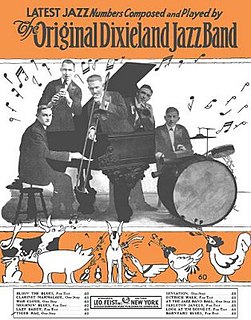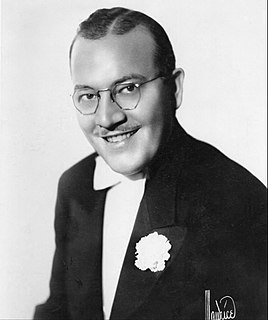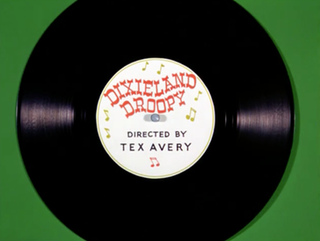
The Original Dixieland Jass Band (ODJB) was a Dixieland jazz band that made the first jazz recordings in early 1917. Their "Livery Stable Blues" became the first jazz record ever issued. The group composed and recorded many jazz standards, the most famous being "Tiger Rag". In late 1917, the spelling of the band's name was changed to Original Dixieland Jazz Band.

Edward "Kid" Ory was an American jazz composer, trombonist and bandleader. One of the early users of the glissando technique, he helped establish it as a central element of New Orleans jazz.

Robert Edward "Bob" Brookmeyer was an American jazz valve trombonist, pianist, arranger, and composer. Born in Kansas City, Missouri, Brookmeyer first gained widespread public attention as a member of Gerry Mulligan's quartet from 1954 to 1957. He later worked with Jimmy Giuffre, before rejoining Mulligan's Concert Jazz Band. He garnered 8 Grammy Award nominations during his lifetime.

"The Saint Louis Blues" is a popular American song composed by W. C. Handy in the blues style and published in September 1914. It was one of the first blues songs to succeed as a pop song and remains a fundamental part of jazz musicians' repertoire. Benny Goodman, Louis Armstrong, Cab Calloway, Bing Crosby, Bessie Smith, Count Basie, Glenn Miller, Guy Lombardo, Peanuts Hucko, and the Boston Pops Orchestra are among the artists who have recorded it. The song has been called "the jazzman's Hamlet". Composer William Grant Still arranged a version of the song in 1916 while working with Handy.

Una Winifred Atwell was a Trinidadian pianist who enjoyed great popularity in Britain and Australia from the 1950s with a series of boogie-woogie and ragtime hits, selling over 20 million records. She was the first black person to have a number-one hit in the UK Singles Chart and is still the only female instrumentalist to do so.
John Charles Franz was an English record producer and A&R man at the Philips label. He was one of Britain's most successful producers in the 1950s and 1960s. While his recordings encompassed several forms of mainstream popular music, his most enduring contributions were to British pop music of the mid-1960s on records by Dusty Springfield, The Walker Brothers, and the early solo recordings of Scott Walker. From 1973, he was responsible for the production of Peters & Lee recordings, which included their No. 1 chart hit "Welcome Home".

Leonard Niehaus was an American alto saxophonist, composer and arranger on the West Coast jazz scene. He played with the Stan Kenton Orchestra and served as one of Kenton's primary staff arrangers. He also played with Ray Vasquez and trombonist and Vocalist, Phil Carreon and other jazz bands on the U.S. West Coast. Niehaus had a close association as composer and arranger on motion pictures produced by Clint Eastwood.

"Jezebel" is a 1951 popular song written by American songwriter Wayne Shanklin. It was recorded by Frankie Laine with the Norman Luboff Choir and Mitch Miller and his orchestra on April 4, 1951 and released by Columbia Records as catalog number 39367. The record reached number 2 on the Billboard chart and was a million seller. The B-side, "Rose, Rose, I Love You", was a hit too and reached number 3.

"Tiger Rag" is a jazz standard that was recorded and copyrighted by the Original Dixieland Jass Band in 1917. It is one of the most recorded jazz compositions. In 2003, the 1918 recording of "Tiger Rag" was entered into the U.S. Library of Congress National Recording Registry.
Tex, Don and Charlie are an Australian supergroup formed by Tex Perkins, Don Walker and Charlie Owen. Their first studio album Sad But True was released in 1993, two others were released in 2005 and 2017.

Walter Gerhardt "Pee Wee" Hunt was an American jazz trombonist, vocalist, and bandleader. Hunt was born in Mount Healthy, Ohio. He developed a musical interest at an early age, as his mother, Sadie, played the banjo and his father, Edgar C., played violin. He had a younger sister, Marian, and younger brother, Raymond. The teenage Hunt was a banjoist with a local band while he was attending college at Ohio State University, where he majored in Electrical Engineering, and during his college years he switched from banjo to trombone. He graduated from the Cincinnati Conservatory of Music. He joined Jean Goldkette's Orchestra in 1928.

William C. "Buster" Bailey was an American jazz clarinetist.

Dixieland Droopy is a 1954 animated short subject in the Droopy series, directed by Tex Avery and produced by Fred Quimby for Metro-Goldwyn-Mayer.

The "Black and White Rag" is a 1908 ragtime composition by George Botsford.
Colin James Bailey was British-born American jazz drummer.
Dixieland, sometimes referred to as hot jazz or traditional jazz, is a style of jazz based on the music that developed in New Orleans at the start of the 20th century. The 1917 recordings by the Original Dixieland Jass Band, fostered awareness of this new style of music.

Robbert Arris Jules "Rob" Agerbeek is an Indo Dutch boogie-woogie and jazz pianist and winner of several jazz concourses in the Netherlands in the late 1950s. He is regarded as one of Europe's finest jazz pianists, covering the full spectrum of jazz styles from his early days of Boogie-woogie to Chicago traditional Jazz, swing and contemporary jazz.
Dixieland is a traditional style of jazz music.
"Moonlight Gambler" is a song written by Bob Hilliard and Phil Springer and performed by Frankie Laine featuring Ray Conniff and His Orchestra. It reached #3 on the U.S. pop chart and #13 on the UK Singles chart in 1957.

"Russian Rag" is a 1918 ragtime jazz piano composition by George L. Cobb. The composition was published by Francis, Day & Hunter Ltd.














